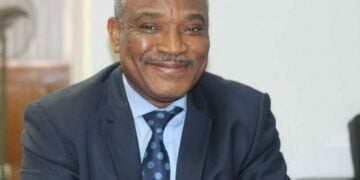As an employer, are you worried by Nigeria’s 33.3% unemployment rate?
Globally, it is agreed that out of every ten jobs created, the private sectors create at least eight or nine and when you are expected to do that and for certain reasons your capacity and ability to do that is compromised by factors beyond your control, then it is a source of worry for you. The level of our GDP growth is directly proportionate to the level of growth of organized businesses.
While some complain of the high level of unemployment, you also have some agencies of government stifling ability f businesses to generate employment. While the Ministry of Labour and Employment complaining of unemployment, you also find some agencies of the same government constituting nuisance to organized businesses through their activities. So, rather than promote businesses, they create bottlenecks for effective functioning of such businesses. Such inherent, systemic contradiction is also a serious cause of concern for us. Most times you have businesses closing down or relocation to other countries.
What specifically are those contradictions?
The contradictions stem from many areas. For instance, the style of regulation in Nigeria is concerning. Many a times you find regulators crossing their thresholds of regulation to income generation. Then, the dynamics of the organized businesses will change. The contradictions in the system are also a source of worry for us. It is quite unfortunate that sometimes there is also contradiction in government, even among operatives of the same government, we have regulators whose function is strictly to regulate; they are not meant to be income generating agencies.
Rather than regulate and make the environment more friendly, they will rather create bottle necks like setting trap for businesses in such a way that you will be confined or constrained to pay fines, taxes or fees. Those are the inherent contradictions.
The lack of alignment between the fiscal and monetary policies is also a process that is negating itself. Your fiscal policies will continue to neutralize your monetary policies. And it creates problems for businesses in the context of planning, also creates problem for the economy. An average investor who had faced regulatory challenges will tell potential investors about the tough environment in Nigeria. The investor will look for an environment where he can maximize profit, where the judiciary is working and working effectively so that if there are issues, he’s sure that the issues can be resolved by the court.
World Bank ranked Nigeria as 131 out of the 190 countries of the world in ease of doing business. What should Nigeria do to improve ease of doing business?
It’s not rocket science. What businesses need is input and that is within the context of raw materials. And because of natural conspiracy, some of those natural resources are not available here. You have to import them. Now, businesses need access to forex. We complain about the issue of forex but not realizing that we created the problem arising from forex. We are an oil producing country; we have our quarter that is given by OPEC. As part of those contradictions, we conspire with thieves to be stealing the oil. We created the problem of forex and subsidy. Those are the areas forex is being syphoned.
It just takes some levels of political will. Provide input and make the policy environment friendly to drive business. Provide security and generally, let the salary of the citizens be able to take them home. When the disposable income of an individual is sufficient enough that is when he can think of patronizing businesses. If the businesses cannot sell, the products the businesses produce will probably begin to expire. If they are running to expiry, a fraudulent business man will neither change the expired date or leave those products and recirculate the same product to the economy. Unsuspecting Nigerians will eat the products and another health issue will arise. We create a system that makes us very unproductive.
In a bid to ensure local production of consumable products, Nigeria has found itself enmeshed in standardization crises. How can Nigeria achieve the target of conserving forex and still ensure standardization?
The long time solution to forex scarcity is when you produce raw materials in your environment. For certain reasons, you realise that government also creates a challenge and an environment that doesn’t make growing those raw materials locally attractive.
The issue of standardization is also very germane because one of the issues we have, not only Nigeria, African as a whole, is not adding value to what we have to export. If we find it difficult to do the most basic of them, crude oil refining – we find it difficult to do, then how are we going to handle the more seemingly complex value adding for manufactured products? We find it difficult to maintain and sustain refining of crude. Then what’s the guarantee that we we’ll do that for products like cocoa and tomatoes, for instance? It is good for us to deal with the issue of backward integration, it is a direct way for us to reduce our propensity for forex. The more we seek forex the more damage we do to the value of the Naira.
Nigeria’s GDP grew by 3.52% in Q4 of 2022. Curiously, key economic indicators like inflation, unemployment and per capital income are still in the negative curve. Why?
When that happens, it calls into question the veracity of that growth. We also know that some sectors like ICT, Agriculture to some extent have been the drivers of the economy. You might experience growth but the growth is not an inclusive growth. Let’s look at those elements in the country – those sectors that have the propensity to drive other sectors along with them. Let’s give some level of focus to those sectors. So that as those sectors grow, they can pull others along with them. Nigeria’s economic growth is not inclusive. To do so, let’s look at manufacturing, construction, agriculture because of their ability to generate employment and income.
How can Nigeria take advantage of the African continental free trade Area agreement?
Nigeria is a massive market and many countries that signed up for the agreement probably did so because of the huge market that is Nigeria. Not taking advantage of that market means Nigeria has positioned its local businesses in a disadvantage state.
To take advantage of it, we need to look at the issues with our regulatory environment; improve on the ease of doing business, government needs to be serious about it.
What is your agender for the incoming administration?
The incoming government should first of all stabilize the macro economy. As it stands, there is so much confusion in the monetary and fiscal policy environments. The government must as a matter of urgency deal with the issue of subsidy. We must get the refineries to work. Spending over N5 trillion on subsidies – on consumption is more than absurd. They must fix the refineries and subsequently remove subsidy so that we can save that over N5 trillion we are spending on consumption.
Which should come first, refineries or subsidy removal?
Fix the refineries before removing fuel subsidy. The risk is that the average Nigerian is already impoverished. Two months ago we were told over 100 million Nigerians are multi-dimensionally poor. So, creating or implementing policies that will further drag them down the pover line is risky. It’s risky socially, risky security wise.
The purchasing power of Nigerians is already reducing; inflation is high; salary is not increasing. So, coming up with policies that will further impoverish Nigerians is not what anybody needs at this time. Let the government take responsibility, fix the refineries. Then, remove the subsidy. Fix the refineries before removing subsidy because it’s practically possible to do.
We have been told by the current government that two refineries are about to start production.
The incoming government must give due attention to the rail sector, to the productive sector. We must deal with the issue of availability of forex by dealing with oil theft to meet your OPEC quota. And once you can sell maximally, you generate more income. The regulatory and legislative environments must be made to be deliberately business supportive. The legislature must focus on making the laws not interpreting the law.
NECA recently complained that government and indeed, the political class was focusing attention on the political implication of currency redesign policy of the CBN without considering its effect on businesses. What are those effects?
We (Nigeria) just have a way of creating a mess out of an issue that is not messy. And part of the contradictions I mentioned is that while we are about making certain level of progress, we also create issues that will retard that progress. In the midst of some improvements in the aspects of GDP growth and curbing oil theft, we came up with the issue of Naira redesign. Let’s forget the political issue of whether people buy vote or not.
The electoral Act has also created provisions to deal with those that will spend beyond a certain amount for campaign and during the elections. Whether we are throwing the particular sector of the Act into the dustbin, I wouldn’t know. Nigeria’s economy is predominantly informal in nature with billions transacted on daily basis in cash. If you want to decree everybody into the banking system, one the things we should have done is to first, create infrastructures to enable transaction. Economy is basically about production and consumption. So, if there is production and you create constraints for consumption, you are not only harming the person that is about to consume, you are also creating serious problem for the person that is producing!
I know the CBN Governor has come out to apologise about the scarcity of the banknotes. …the implementation of the policy on currency swap is less than primary school implementation. That is unfortunate. How can you say that the policy you are coming up with to change the fundamental dynamics of the economy, the implementation is not well thought out. In normal climes, people take serious view of those kinds of comments.
Predominantly, the policy is laudable, beautiful, a way we think we should go but the implementation is less than a primary school implementation; the way we have seen it. And it’s just obvious for everybody to see.
Nigeria’s human capital development is one of the worse in the whole world at 36%. Some say that may also be responsible for the high unemployment in Nigeria. What is the way out?
Every input and transaction contribute to GDP. If you have restrained consumption or restrained people ability to transact business it creates the Issue of unemployment if I cannot produce, why will I be keeping them if I cannot sell why will I keep producing? Most likely, the perishable goods will go bad.
Institutions have gone on strike for months, it’s a problem. What is the value or the quantum of amount we have in the national budget for education? Those are the causes. What is our deposition? While governments are struggling to fund the already existing universities, they are also creating and legislating more universities. Where is the fund to fund that? What is the quality of the graduates that will come out of those universities? First, let’s get our curriculum right. Second, let’s give attention to funding of universities.
Let’s interrogate if the curriculum in the universities is it one that speaks to the needs of these industries. Review and deal with curriculum of the universities. You have to deal with the key components of skills, technical and vocational education is one of the easiest ways for acquiring skills. Some go through technical and vocational education or apprenticeship; we have a robust partnership with industrial training fund (ITF) we run technical skills development project it has been running for over 10 years and providing practical hand on skills for Nigeria youths so that it reduced their propensity to start looking for job.
Do you think there is anything the outgoing government can still do to improve the economy?
For the current government, they’ve tried their best; we can’s say they’ve not done anything. But what they have not really dealt with are those inherent contradictions. You make one step progress and then take another two steps back. Those are due to those contradictions. We believe strongly that it shouldn’t have taken eight years for this government to deal with the issue of oil theft and fuel subsidy.
The government should have within eight years been able to fix the refineries. If an individual can build a refinery within three years, we don’t have any business of saying we can’t fix those refineries. If there is sabotage going on, let’s deal with it.
Let the current government deal quickly with the issue of fixing the refineries before May 29. It’s not sufficient to say you leave the removal of fuel subsidy till June. That’s ambushing of the next government. It’s possible. We have committed huge amount for turnaround maintenance of those refineries. If it’s not possible to fix them, let those that have collected money for the turnaround maintenance come and account for it!
Also, the issue of fiscal and monetary policies mis–alignment is also one thing they should deal with. It’s shameful for the CBN to come out with a policy and the minister of finance saying she is not aware of it. Even though they have autonomy, because of the critical nature of those two policies, there must be an alignment between both of them. And the president has not done well in reining them in. for the sake of the economy, there must be an alignment between both sides. That will create a foundation for the next government to ride on.
For whatever reason, we should just stop borrowing pending when this government will go. We shouldn’t borrow for the next government to pay.





